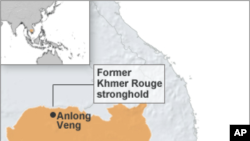The United Nations says Cambodia is refusing to permit a Swiss investigating judge to take his place on the tribunal trying suspected Khmer Rouge war crimes, blocking at least two pending cases.
A spokesman for U.N. Secretary-General Ban Ki-moon said Friday the U.N. has been formally notified of Cambodia's decision not to appoint Swiss magistrate Laurent Kasper-Ansermet to the court.
The spokesman described the decision as a "matter of serious concern," and said it breaches the terms of the 2003 agreement between Cambodia and the United Nations that established the tribunal.
Kasper-Ansermet was to have filled a vacancy created by the departure of German judge Siegfried Blunt - who resigned late last year complaining of interference by the government of Prime Minister Hun Sen.
The tribunal has convicted a notorious Khmer Rouge prison warden and is hearing a second case involving three top former Khmer Rouge leaders. But as long as Blunt's post remains vacant, the court cannot bring anyone else to trial.
Blunt first came under criticism when a prosecutor complained last year that he and co-investigating magistrate You Bunleng had failed to properly investigate what have come to be known as Cases 003 and 004. Several international staff members also resigned to protest the handling of the cases.
Details of the two cases have never been officially released. Press reports, however, say both involve former Khmer Rouge military commanders who were allegedly complicit in the arrest, imprisonment and in some cases massacre of thousands of Cambodians.
Kasper-Ansermet has had his own problems with his Cambodian counterpart. Shortly after his arrival in Cambodia, he charged that You Bunleng was blocking him from releasing important information about the two suspended cases.
You Bunleng responded that Kasper-Ansermet was not yet legally accredited to the court and did not understand the legal principles of its work.
Cambodia's Supreme Council of Magistracy met last week to decide whether to approve the Swiss jurist's appointment. But U.N. spokesman Martin Nesirky told VOA's Khmer service this week that Cambodia was "under an obligation" to appoint the reserve judge when there is a vacancy.
A coalition of 23 Cambodian rights and relief groups went further. In a press release Thursday, the Cambodian Human Rights Action Committee argued that Kasper-Ansermet was officially appointed when he was named a reserve magistrate and that he requires no further approval.
The group also called for an independent inquiry into the conduct of the investigating judges, saying the legacy of the tribunal will be seriously damaged without one.
No such inquiry is planned, although the U.N. this week named American lawyer David Scheffer, a former U.S. ambassador-at-large for war crimes, to observe and advise on the court's work.
About 1.7 million Cambodians are believed to have died or been executed during the period of Khmer Rouge rule in the late 1970s.
Prime Minister Hun Sen has argued that going ahead with more prosecutions would deeply divide Cambodian society, destabilizing the country.
Cambodia Refuses to Seat Swiss Judge at Khmer Rouge Tribunal




